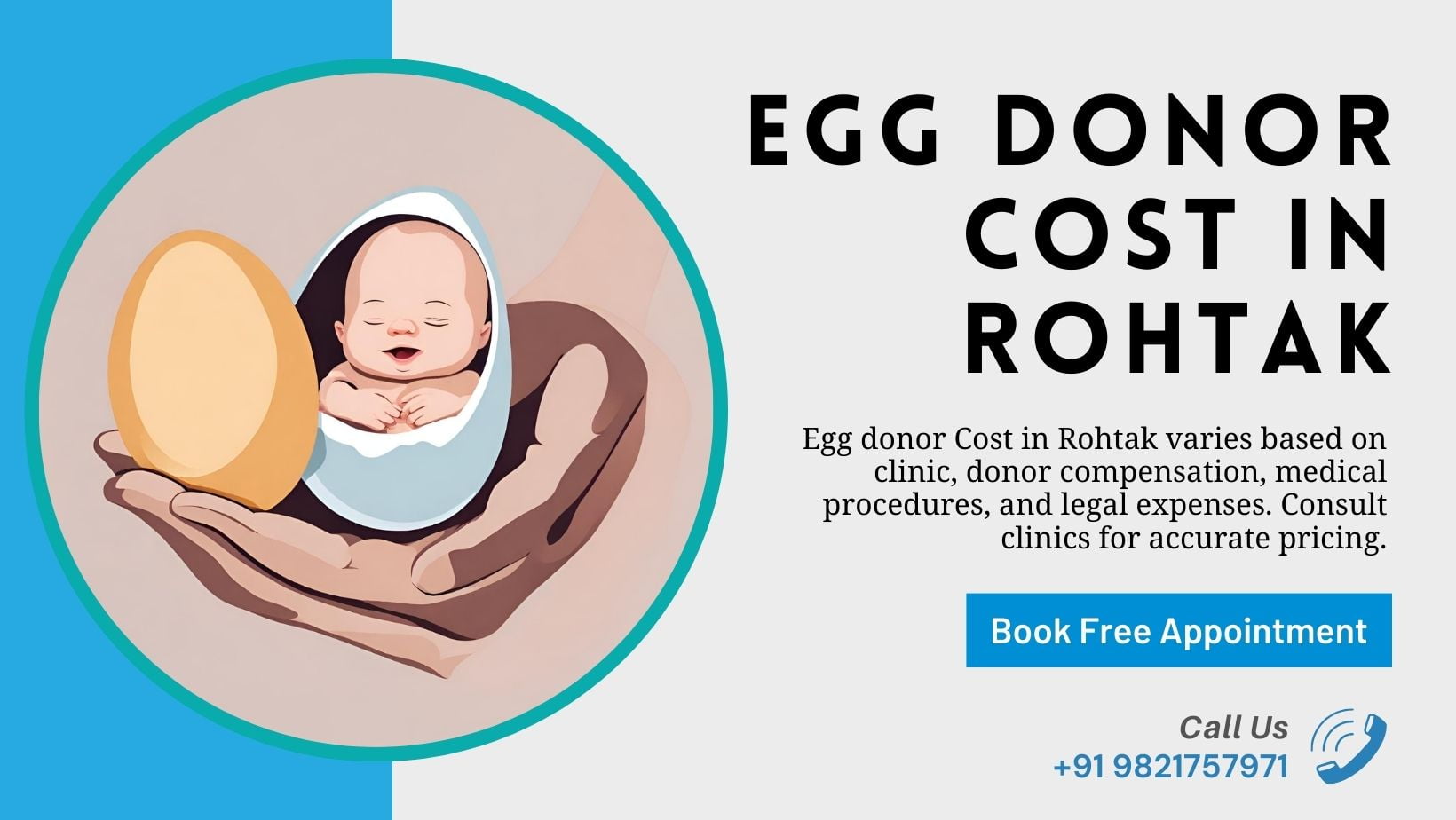Looking to understand the egg donor cost in Rohtak? If you’re considering egg donation as an option for building your family, it’s essential to grasp the financial aspects involved. In Rohtak, a city renowned for its medical facilities, the cost of egg donation can vary based on several factors.
These include the clinic or agency you choose, the qualifications and experience of the egg donor, as well as any additional services provided as part of the process. Typically, the egg donor cost in Rohtak encompasses various expenses such as medical screenings, medications, retrieval procedures, compensation for the donor, and clinic fees.
It’s crucial to inquire about all potential expenses upfront to make an informed decision. Understanding the financial implications ensures you can plan appropriately and proceed confidently with your journey towards parenthood.
In this informative guide, we’ll delve into the specifics of Egg Donor Cost in Rohtak, providing you with the insights needed to navigate this aspect of assisted reproductive technology effectively. Whether you’re exploring options or ready to take the next step, having a clear understanding of the financial considerations is paramount.
The Egg Donor Journey
The egg donor journey involves altruistic decision-making, thorough evaluations, and medical procedures to provide hope and opportunity for individuals and couples struggling with infertility, ultimately facilitating the creation of families.
Exploring the Path of Egg Donor
The journey of an egg donor is a profound and altruistic one, marked by compassion and empathy towards individuals or couples struggling with infertility. It begins with a decision to offer the gift of life by donating eggs to those in need. Egg donors undergo a series of evaluations, screenings, and medical assessments to ensure their suitability for the donation process. This path involves careful consideration, thoughtful reflection, and a willingness to contribute to the creation of families.
The Crucial Role of Egg Donors in Fertility Treatment
Egg donors play a pivotal role in fertility treatment, offering hope and opportunity to individuals and couples facing challenges in conceiving naturally. Their contribution enables intended parents to fulfill their dreams of parenthood, overcoming biological obstacles and fulfilling their familial aspirations. Without the generosity and selflessness of egg donors, many individuals would be unable to experience the joy of raising children and building families, highlighting the indispensable role they play in the field of reproductive medicine.
Understanding the Process of Egg Donation
The process of egg donation involves several stages, each carefully orchestrated to ensure the safety and well-being of both the donor and the recipient. It typically begins with a comprehensive medical and psychological evaluation of the donor to assess their physical health, reproductive history, and suitability for donation. Once cleared, the donor undergoes ovarian stimulation using hormone medications to encourage the production of multiple eggs. These eggs are then retrieved through a minimally invasive surgical procedure known as follicular aspiration. Following retrieval, the eggs are fertilized in a laboratory setting, and resulting embryos are transferred to the recipient’s uterus or frozen for future use. Throughout this process, donors receive support, guidance, and medical care to ensure a smooth and successful experience.
Key Cost Contributors
Location, screening/testing, legal/administrative fees, medication expenses, and additional services are all key cost contributors in understanding the expenses associated with egg donation in Rohtak.
A. Location Matters: How Rohtak Influences Donor Expenses
The geographical location of Rohtak plays a significant role in influencing donor expenses. Rohtak, being a city in the state of Haryana, India, has its own unique economic dynamics and cost structures compared to other cities or regions. Factors such as the cost of living, availability of medical facilities, and local regulations can impact the overall expenses associated with egg donors in Rohtak. Additionally, the demand-supply dynamics in the region can also influence the pricing of donor services, making it essential for individuals considering egg donation to understand how the location affects the costs involved.
B. Evaluating the Costs of Donor Screening and Testing
One of the essential aspects of egg donation is the thorough screening and testing process that potential donors undergo. This includes medical examinations, genetic testing, psychological evaluations, and other assessments to ensure the suitability of the donor and the quality of the eggs. Each of these screening procedures incurs costs, which can vary depending on the complexity of the tests and the standards followed by the fertility clinics in Rohtak. Understanding the breakdown of these costs is crucial for individuals planning to engage in egg donation, as it provides transparency into the financial aspects of the process.
C. Unveiling Legal and Administrative Fees in Rohtak
In addition to medical expenses, there are also legal and administrative fees associated with egg donation in Rohtak. These fees encompass various aspects such as legal consultations, documentation, and administrative processes involved in egg donation arrangements. Fertility clinics and legal professionals may charge different fees for their services, and it’s essential for individuals to be aware of these costs upfront to avoid any surprises later in the process. Clear communication and understanding of the legal and administrative fees ensure a smooth and transparent egg donation experience for all parties involved.
D. Medication Expenses: A Vital Aspect of Donor Costs
Medication expenses constitute a significant portion of the overall costs associated with egg donation in Rohtak. Donors are typically required to undergo ovarian stimulation using fertility medications to increase the number of eggs produced during a single cycle. These medications can be expensive and may vary in cost depending on factors such as the type of medication prescribed, dosage required, and duration of treatment. Understanding the medication expenses involved in the egg donation process allows donors to plan their finances accordingly and ensures access to the necessary medications without any financial constraints.
E. Additional Services That Impact the Total Cost
Apart from the core procedures and expenses mentioned above, there are additional services that can impact the total cost of egg donation in Rohtak. These services may include counseling sessions for donors, travel and accommodation arrangements, storage fees for frozen eggs, and other ancillary services provided by fertility clinics. While some of these services may be optional, others may be essential for ensuring the success and well-being of both the donor and the recipient. Understanding the range of additional services available and their associated costs allows individuals to make informed decisions about their egg donation journey and budget accordingly.
Egg Donor Cost in Rohtak
Considering egg donation in Rohtak? The egg donor cost in rohtak typically ranges from INR 60,000 to INR 100,000, encompassing various aspects such as medical assessments, donor compensation, and clinic fees. This cost may vary based on factors like the donor’s characteristics and any additional services needed. Clinics in Rohtak usually offer comprehensive packages covering the entire process, including donor screening and the retrieval procedure. Prospective parents should research and compare different clinics to understand the breakdown of costs and services offered. Many clinics also provide financing options or payment plans to help make the process more accessible. Understanding the expenses involved is crucial for informed decision-making when considering egg donation in Rohtak.
Delving into the Breakdown
Exploring the detailed breakdown of egg donor costs, including initial consultations, matching fees, surgical procedures, donor compensation valuation, and essential post-procedure care aspects. Understanding each component is crucial.
Initial Consultation: The First Step towards Donor Selection
The initial consultation marks the beginning of the egg donation process, serving as a pivotal step towards selecting the most suitable donor. During this consultation, intended parents meet with fertility specialists to discuss their needs, preferences, and expectations. The medical team evaluates the intended parents’ medical history and conducts necessary tests to assess their fertility status. Additionally, the consultation involves a thorough discussion of the egg donation process, including the legal, medical, and financial aspects. This comprehensive assessment lays the foundation for a successful donor selection process.
Matching Fees: Finding the Right Donor Match
Matching fees encompass the costs associated with finding the ideal egg donor match for the intended parents. Fertility clinics employ sophisticated matching algorithms and databases to facilitate this process efficiently. The fees cover the administrative expenses involved in reviewing donor profiles, conducting compatibility assessments, and coordinating communication between the intended parents and potential donors. Additionally, the matching fees may include the compensation for the clinic’s staff members involved in the matching process. Finding the right donor match is crucial for ensuring a successful and fulfilling egg donation journey for all parties involved.
The Surgical Procedure: Costs Involved in Egg Retrieval
The surgical procedure refers to the medical process of retrieving eggs from the selected egg donor’s ovaries. This procedure, known as egg retrieval or follicular aspiration, is performed under sedation or anesthesia in a clinical setting. The costs associated with the surgical procedure include facility fees, anesthesia fees, and surgical equipment expenses. Additionally, the fees cover the professional fees for the medical team involved in performing the procedure, including the fertility specialist, anesthesiologist, and nursing staff. The safety and efficacy of the egg retrieval procedure are paramount, ensuring the successful collection of viable eggs for fertilization.
The Valuation of Donor Compensation
Donor compensation refers to the financial compensation provided to egg donors for their time, effort, and inconvenience associated with the egg donation process. The valuation of donor compensation varies depending on various factors, including the donor’s age, medical history, and previous donation experience. Fertility clinics typically offer competitive compensation packages to attract and retain qualified egg donors. The compensation may cover expenses such as travel costs, lost wages, and inconvenience fees. It is essential to establish clear and fair compensation guidelines to ensure transparency and ethical conduct throughout the egg donation process.
Post-Procedure Care: Essential Aspects of Donor Support
Post-procedure care encompasses the medical and emotional support provided to egg donors following the egg retrieval procedure. While the physical recovery period after egg retrieval is relatively short, lasting a few days to a week, donors may require ongoing support and monitoring. Fertility clinics offer post-procedure consultations to assess the donor’s well-being, address any concerns or complications, and provide guidance on post-retrieval care instructions. Additionally, donors may have access to counseling services to help them navigate the emotional aspects of the donation process. Ensuring adequate post-procedure care is essential for promoting the health and well-being of egg donors and fostering a positive donation experience.
Understanding Donor Compensation
Factors Influencing Compensation for Donors: The compensation offered to egg donors is influenced by various factors, including the donor’s age, fertility history, and overall health. Younger donors with proven fertility and good health often command higher compensation due to the higher likelihood of successful egg retrieval. Additionally, donors with specific desirable traits, such as higher education, athletic prowess, or certain ethnic backgrounds, may also receive increased compensation. The demand for egg donors in a particular region or clinic can also affect compensation rates, with higher demand typically leading to higher compensation.
Legal and Ethical Dimensions of Donor Compensation: The legal and ethical considerations surrounding donor compensation vary by country and jurisdiction. In many places, including India, guidelines and regulations govern the compensation process to ensure fairness and ethical treatment of donors. Ethical considerations include avoiding exploitation of donors and ensuring that compensation does not unduly influence their decision to donate eggs. Legal frameworks often dictate the maximum allowable compensation and may require donors to undergo counseling to fully understand the implications of their decision. Additionally, legal contracts are typically drafted to outline the terms of compensation and the rights and responsibilities of both parties involved in the egg donation process. These legal and ethical dimensions play a crucial role in ensuring transparency and fairness in the compensation of egg donors.
Conclusion
In conclusion, navigating the landscape of egg donor costs in Rohtak demands informed decision-making and thorough understanding. As evidenced by the comprehensive guide provided, factors such as clinic reputation, legal considerations, and financial implications significantly influence the overall expenses. By delving into the intricacies of donor compensation and the various financial strategies available, individuals can approach the process with clarity and confidence. Moreover, the exploration of frequently asked questions offers valuable insights into addressing common concerns and uncertainties surrounding egg donation. Ultimately, while the journey may present challenges, armed with knowledge and awareness, prospective parents can embark on their path to parenthood with resilience and hope, knowing they are well-equipped to navigate the complexities of egg donor costs in Rohtak.
Frequently Asked Questions (FAQs)
Q1. Are there any undisclosed expenses associated with donor services?
Ans: While most reputable fertility clinics are transparent about the costs involved in donor services, it’s essential for individuals to inquire about any potential undisclosed expenses upfront. Some clinics may charge additional fees for services such as anesthesia, laboratory tests, or administrative tasks. It’s crucial to thoroughly review the contract and ask questions to ensure clarity regarding all potential expenses before proceeding with the donor process.
Q2. Is there room for negotiation in donor expenses?
Ans: In some cases, there may be room for negotiation in donor expenses, particularly if the clinic offers financing options or payment plans. However, it’s essential to approach negotiations respectfully and be prepared to justify any requests for adjustments to the costs. Factors such as the clinic’s policies, the demand for donor services, and individual circumstances may influence the extent to which negotiation is possible.
Q3. Factors determining the final cost of donor services?
Ans: The final cost of donor services can be influenced by various factors, including the location and reputation of the fertility clinic, the specific services included in the package, the complexity of the donor process, and any additional expenses such as medication or legal fees. Additionally, the compensation requested by the egg donor and any unforeseen medical complications can also impact the overall cost. It’s essential to discuss these factors with the clinic and obtain a clear understanding of the total expenses involved.
Q4. Are there any financial aid programs for donor costs in Rohtak?
Ans: Yes, some fertility clinics in Rohtak may offer financial aid programs or assistance options to help individuals cover the costs of donor services. These programs may include discounts, payment plans, or access to financing resources. It’s advisable to inquire with the clinic about available financial aid options and eligibility criteria.
Q5. Finding Reputable Donor Services in Rohtak?
Ans: When searching for reputable donor services in Rohtak, it’s essential to research and compare multiple fertility clinics. Look for clinics with a track record of success, positive patient reviews, and experienced medical professionals specializing in reproductive medicine. Additionally, consider factors such as clinic accreditation, success rates, and the range of services offered to ensure you find a reputable provider for your donor needs.
Q6. Legal Implications of Donor Services in India?
Ans: In India, there are legal implications associated with donor services, including regulations governing the compensation of egg donors, consent requirements, and parental rights. It’s crucial to familiarize yourself with the relevant laws and regulations governing donor services in India, including any restrictions on donor compensation and the legal rights and responsibilities of all parties involved in the process.
Q7. Timeframe for the Donor Process?
Ans: The timeframe for the donor process can vary depending on various factors, including the availability of suitable donors, the individual’s medical history, and the specific requirements of the fertility clinic. Generally, the donor process involves several stages, including donor screening, matching, ovarian stimulation, egg retrieval, and embryo transfer. The entire process can take several weeks to months to complete, with each step requiring careful coordination and monitoring by medical professionals.
Q8. Handling Unsuccessful Donor Cycles?
Ans: Dealing with unsuccessful donor cycles can be emotionally challenging for individuals undergoing fertility treatment. It’s essential to have open and honest discussions with your medical team about the reasons for the cycle’s failure and explore alternative options moving forward. This may include revisiting the donor selection process, adjusting treatment protocols, or considering other fertility treatment options such as adoption or surrogacy. Additionally, seeking support from counselors or support groups specializing in fertility issues can provide valuable emotional support during this time.




